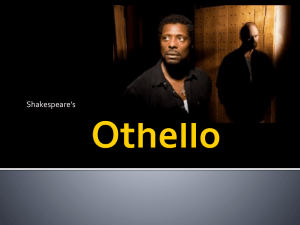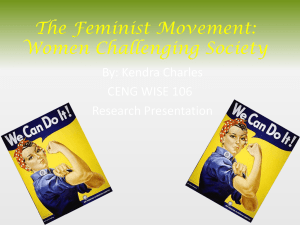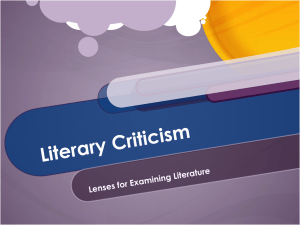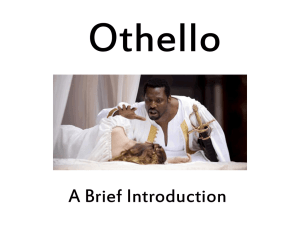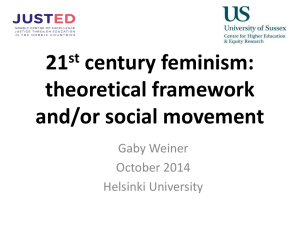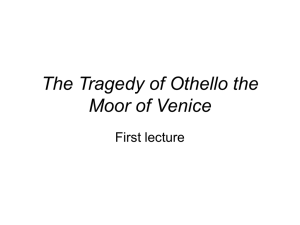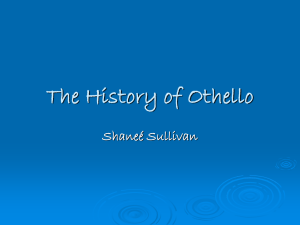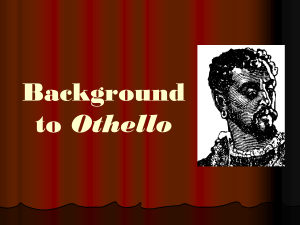Through the Literary Looking Glass KEK
advertisement
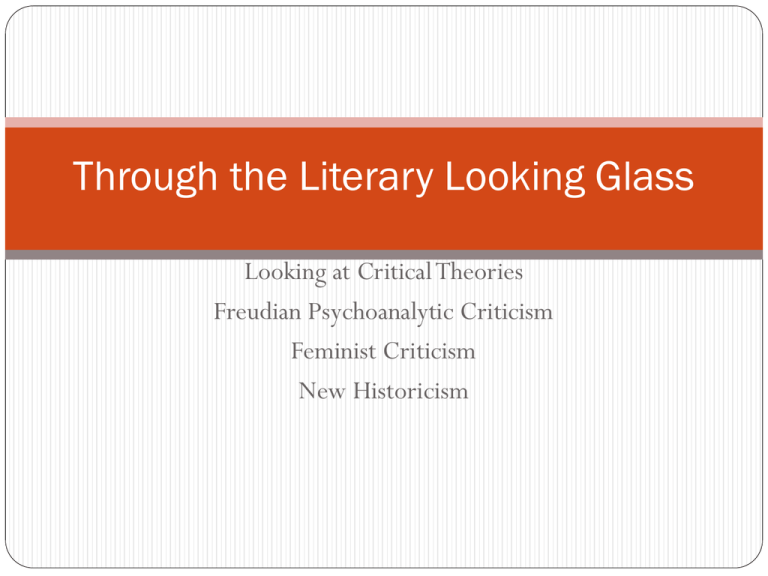
Through the Literary Looking Glass Looking at Critical Theories Freudian Psychoanalytic Criticism Feminist Criticism New Historicism Why? To encourage you to re-think your reading practice and to introduce you to several quite distinct approaches to the reading and analysis of texts. The biggest hurdle for you this year is to learn to personally engage with the text and respond perceptively to it. Hopefully approaching a text from a different literary perspective will allow you to do this. You will then be able to select one approach and apply it to Othello or another text for your achievement standard. The field of literary theory Sprigs from the idea that there is no set way to look at a text. In a world where young people are being increasingly encouraged to think for themselves, the notion of fixed interpretations according to one person’s reading of a situation is becoming less tenable. Just looking at a text from the liberal humanist view (what we do now: largely reading it in isolation, analysing plot, character, setting, structure, style, theme is the most important, assumptions about the author’s intent etc) is not necessarily the right and only way to study a text. Freudian Psychoanalytic Criticism Sigismund Freud (1856 –1939) was an Austrian neurologist who became known as the founding father of psychoanalysis. Activity 1 Read pages 21-27 Make notes on the following: Id= Superego= Ego= The balance between the id and the superego= The Oedipal complex= Dream analysis= Activity 2 Read the Freudian analysis of Lord of the Flies pp.27-28 Read the analysis of Miss Brill using this theory pp.31-32 Applying Freudian Analysis of Othello Activity 3 Fill out the chart that helps you draw out the classic Freudian symptoms or processes that are in Othello and answer the more general questions. Chart Classic Freudian Symptoms Id/Superego imbalance Castration Unresolved Oedipal complex Repression Sublimation Transference Projection Freudian Slip Seen in Othello How does the presence of this element influence the text as a whole and your reading of it? General Questions Is there a main character who grapples with psychological emotional or moral issues? What do you know about this character’s early childhood? What do you know about his/her parental figures (or lack thereof)? Does the character display a healthy id/superego balance in his her actions, interactions and view of the world/ Are his/her actions ever rash or violent? Can you recognise any elements of dream work in the novel? (eg. Sublimation, projection)? Can this text be compared to other works by the same author on a psychological level? Are there repeated character types or symbols? What would they say about the author? What is it in this text that makes it appeal to your own psyche on some level? Why might that be? If you were to relay the entire plot to a psychotherapist as a dream you had last night, which elements would he/she be most interested in? (characters, setting, plot, style, etc) Feminist Criticism Write a few sentences explaining what you think feminist criticism is. What would you do if you were using a feminist approach? Make sure you explain how literature can affect socialisation. Activity 1 Read the feminist criticism of Great Expectations pp.52-53 Read the analysis of Miss Brill using this theory pp. 56-58 Applying Feminist Criticism to Othello When applying feminist theory you need to use a text to interrogate the society in which it is written (Elizabethan/Jacobean). Therefore, you need to do some research on the role of women in this time period and the mechanisms by which the patriarchy was enforced. Using a New Historicist approach along with a feminist approach would work well (see our next theory!) Activity 2 Keep the feminist approach in mind answer these questions for Othello Who has the most power in the text (male vs female characters)? How is this power upheld? Does the text centre around a male or female protagonist? Does the text contain any symbolism that could be read in terms of gender and power? In what ways does the text conform to or add to social ‘constructions’ of the role of women? Does the language in the text seem masculine or feminine? Is the language used by female characters different from that used by male? Reading - The Role of Women in Othello: A Feminist Reading Make summary notes under these headings paying particular attention to how the feminist reading is linked with historical research: Women as possessions Women as submissive Women as temptresses 3.8 Through a Critical Lens Develop an informed understanding of literature and/or language using critical texts 4 CREDITS What to do! Choose a text (Othello ) and a lens to ‘frame’ your investigation 2. Choose a topic 3. Develop a hypothesis to frame the investigation. For example: The Hunger Games on the surface looks to be a film about gender equality but underneath really just serves to reinforce patriarchal society. Or Children can not think morally for themselves in a world where there are no laws or parental control as seen in Lord of the Flies. Or Emilia’s remark in Othello, “They are all but stomachs, and we all but food” (3.4.104) reveals a realistic view of the relationship between men and women in Jacobean England. 1. Research Identify at least two secondary sources: One should be Through the Literary Looking Glass Try to find other non-literary materials that can be read alongside it. These could be: Any non-fiction book published around the same time period as the original text. Biography Excerpts from the media at the time Books of private diaries or letters Accounts of speeches given Government records History textbooks or historical investigations of that period Articles Selecting, Evaluating and Recording your findings It is essential that you provide evidence of your research process You must evaluate each secondary source’s reliability and usefulness to your investigation. You need to record all of your useful information as you go, reflecting on how it helps you to develop insights about your primary text. These will be used to show authenticity and help me to see if you are on the right track. Locating Sources These may be located in our library, any of the district libraries On databases such as EPIC The National Library The internet The history department From Mrs Kelly Source Information related to hypothesis Evaluation Tiffany, Grace (2008) "The pity of it, lago!" in Shakespeare Newsletter Vol 58 Issue 1 pg 31 Othello's and Desdemona's love is based on the pity of stories which are, in a way, performances; Desdemona's pitying response has itself been a sort of performance, as Iago notes: "And when she seemed to shake and fear your looks, she loved them most" (3.3.20708). Reliability: Written many published critical essays about Shakespeare and so is a reliable source Usefulness: She has a different view on Desdemona and so is useful to my investigation Contradicts my hypothesis by saying Desdemona was not deeply in love with Othello but only pitied him Presenting your understanding/findings A report is the standard way to do this However you could present this as a seminar Or annotate a collection of selections from you primary source Bibliography Like any good research assessment you must include a bibliography Possible Topic for 3.8 A Freudian reading of Othello as a whole A Freudian reading of Iago/Othello A feminist reading of a Emilia or Desdemona or Bianca or all three A feminist/New historicist reading of the role of women A feminist/New historicist reading of what was expected of a daughter in Elizabethan/Jacobean England A feminist/New historicist reading of what was expected of a bride in Elizabethan/Jacobean England A feminist/New historicist reading of what rules for courtship/marriage existed at the time of the play? A New historicist reading of race in Elizabethan/Jacobean England. A New historicist reading of religion in Elizabethan/Jacobean England. A New historicist reading of Venice in Elizabethan/Jacobean England. A New historicist reading of the role of Moors/Venetians in Elizabethan/Jacobean England. A New historicist reading of war and the military in Elizabethan/Jacobean England. A New historicist reading of military hierarchy in Elizabethan/Jacobean England.



